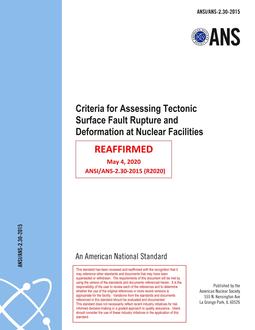
Click here to purchase
ANS 2.30-2015 (R2020) provides criteria and guidelines for assessing permanent ground deformation (PGD) hazard due to tectonic surface fault rupture and deformation at nuclear facilities. Specifically, the purpose of this standard is to provide an outline of procedures and methods for performing probabilistic fault displacement hazard analysis (PFDHA) for surface rupture hazard and probabilistic tectonic deformation hazard analysis (PTDHA) for surface deformation due to displacements along blind (buried) faults. Probabilistic approaches for assessing surface fault displacement and tectonic deformation hazard are relatively new; thus, criteria and guidelines have not been defined previously. PGD due to fault rupture is a potential hazard for nuclear facilities founded across or near a fault. In this standard, only coseismic PGD hazard related to movement on crustal faults is addressed. Deformation in the form of creep or afterslip and uplift and subsidence during subduction zone earthquakes is not addressed. Non-tectonic deformation, as described in Section 5.1, is not addressed in this standard.
Methods to investigate and characterize surface fault displacement and tectonic deformation hazards have advanced significantly, justifying a new standard. Specifically, it is possible to quantify the expected PGD from surface or near-surace fault rupture due to advances in geologic, geomorphic, and paleoseismic techniques used to identify and quantify the location, rate and amount of Quaternary deformation as well as empirical observations of PGD resulting from historical earthquakes.
Product Details
- Published:
- 05/26/2015
- ANSI:
- ANSI Approved
- Number of Pages:
- 59
- File Size:
- 1 file , 1.1 MB
- Redline File Size:
- 2 files , 6.3 MB